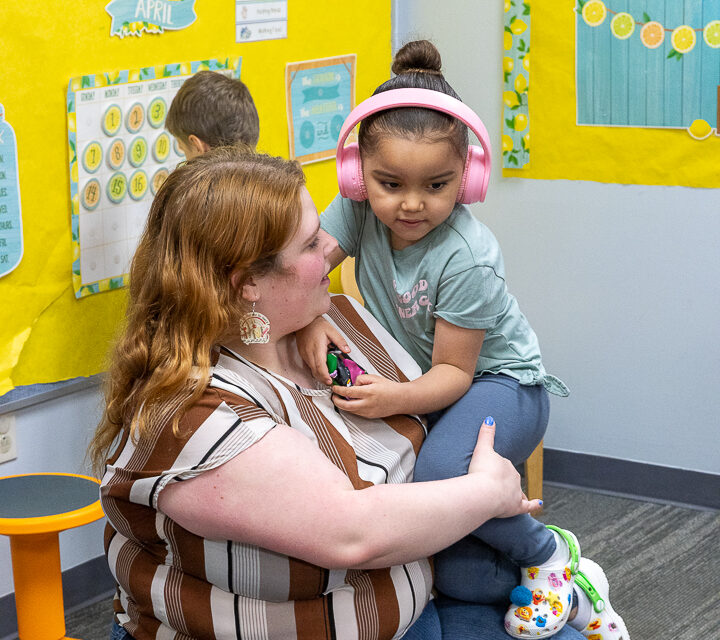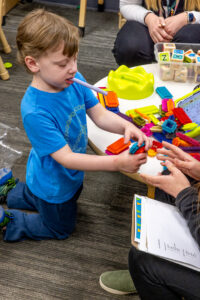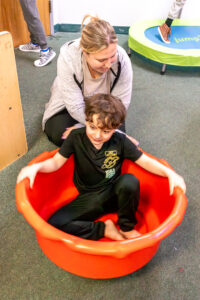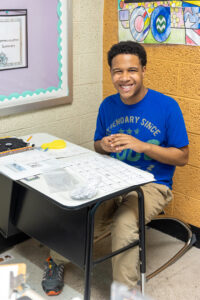Pyramid Consultant Jesseca Collins, M.Ed., BCBA writes about the importance of valuing our learners as human first and prioritizing what is meaningful to them.
Prioritizing Dignity and Connection 
It’s a privilege to have the opportunity to support individuals diagnosed with developmental disabilities and autism. At Pyramid, the diagnosis isn’t the important part of what we do, because the learners we all work with are human first! While planning and implementing interventions, it is essential to remain adaptable and prioritize the skills that hold the greatest significance for each learner.
As teachers, paraprofessionals, Speech Language Pathologists, Occupational Therapists, Board Certified Behavior Analysts, Social Workers, Psychologists and everyone else in the arena, the learners we work with don’t care about what credentials or degrees we hold. What matters is our relationship with each learner. As practitioners we need to show up for learners in a way that meets them where they are and guides them to where they want or need to be. While we often track progress on skills development, we should also put emphasis on how often our learner smiles and shows other signs of enjoying the time they spend with us. We should strive to make sure that our learners are safe, engaged, and challenged yet supported in a way that is truly individualized.

Thinking About Contextually Inappropriate Behavior (CIB)
One challenging aspect of the field is supporting individuals who may engage in Contextually Inappropriate Behaviors (CIBs). I often hear people label these behaviors as being maladaptive, but for whom? From my perspective if a learner continues to choose to engage in a behavior, it’s adaptive for them. Also, guess what? All of us have engaged in CIB in our lives as well! It’s our job to figure out why it is currently working for them and then to collaborate to support the teaching of skills or behaviors that work for them but with less “cost.” Teaching should focus on relevant skills; however, the onus of acquisition cannot only be on the learner. It is our job to look at the environments and conditions our learners live their lives in and our own behavior to figure out how to best support their growth, development and happiness.
Individualize Skill Development
Our Pyramid Approach to Education® helps us to build effective educational environments (whatever or wherever they might be) so that learners get to just be themselves. What I appreciate about this approach is that it focuses on more than one curriculum or skill. Whether you have a learner who lives in Montana and needs to learn to ride a tractor and feed the animals on their family ranch or a learner who lives in Chicago and needs to learn to ride public transit and to purchase their favorite snack at the corner store we can teach it! There will never be a one-size-fits-all approach to teaching. We all need to build our tool kits so we have various researched-based strategies from which to draw. That said, our learners don’t often read the research, so operating within the “our learners are human first approach” is paramount.
 Let Learners be Themselves
Let Learners be Themselves
Recently, I met a learner who was engaging in behavior that she found productive, but her family and teachers didn’t find it hilarious. This learner was forcing out flatulence loudly and frequently and in any environment. To her, this was hilarious, and she was being funny, but that’s not how it was being received. This learner loves slapstick comedy. The focus of intervention tended to be on asking her to stop the flatulence when told, but does this response approach the situation from the right perspective? If we consider something the learner values, “being funny,” we come to a different conclusion about how to support her. Instead, let’s teach her to be funny in a way that is contextually appropriate for her and her family. We could teach her to use her Speech Generating Device to initiate and tell jokes, to do simple pranks, to say “look” to call someone over to watch a video she finds funny and laugh with her. We should not only teach her how to be “funny” but also teach her to discriminate with whom, and where and when! When we begin behavior support conversations by asking ourselves, “What is it that the learner needs or wants to achieve?” or “What would the situation look like in the absence of the things we are concerned about?” We will engage in skill building that respects our learners. It should be apparent we are on their team and our support is helping them build a life that is safe and makes them smile!
Be Flexible! 
One of the tricky things about behavior intervention, especially when we are tasked with writing behavior plans, is that the paperwork doesn’t do a great job of capturing that our learners are human first. If I go to work, develop a headache and just have one of those days, I might decide to delay my grocery shopping until tomorrow, pick up takeout instead of cooking, or skip the gym. No one shows up to remind me about what I was supposed to do after work. As adults we have the autonomy to be flexible with ourselves and we have the communication and self-advocacy skills to navigate those days. When we set out to support our learners we should remember “what’s good enough for us should be good enough for them.” They have the right to learn skills that support self-determination and self-advocacy as well. We want to teach them to be flexible and we need to be flexible as well.
Happiness is worth pursuing, let’s tackle the challenges together!
LEARN MORE:
- The Dignity Project from the Profound Autism Alliance
- Learn more about the Pyramid Approach to Education
- The Language of Emotions On-Demand Workshop
- Check out our free materials and resources
- Join our PECS User Support Group
Written by Jesseca Collins, M.Ed., BCBA
© Pyramid Educational Consultants, LLC. 2025
